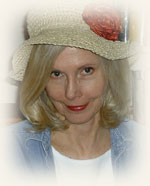Presentations: Anne Lovett

A View from Jerusalem's Wall
Why do we travel? Is it merely curiosity, an eagerness to find out for ourselves what a different culture or land is like, an urge for adventure, a thirst for knowledge beyond our borders? If we are wise, we also travel to find out about ourselves.
It was nearly twenty years ago that I joined a group of thirty Episcopalians on a pilgrimage to the Holy Land. A few months before the trip, hostilities between Israelis and Palestinians broke out after a long period of relative calm. With each reported killing, the number in our group dwindled. The week before the trip only thirteen of us, plus the two tour leaders, remained.
In Jerusalem, beneath polite and friendly behavior, people were edgy. At various points around the city soldiers stood guard or patrolled the barbed wire-strung areas. Undercurrents seemed to crackle in the dry desert air—fear, tension, mystery, holiness?
We’d looked forward to open shops and bazaars, with Arab vendors prepared to haggle for souvenirs of roly-eyed carved camels and doleful figures of Jesus, for jewelry, pottery, icons, metalwork and weaving. We’d wanted to visit bookshops and document shops, such as the one that bought the first Dead Sea scrolls from their Bedouin finders, as well as falafel shops and kebab stands and those food vendors that sell Arabian fried pastry. Alas, the shops were shuttered most of the time, and we got boiled-chicken dinners in the hotel. One day our tour guide managed to smuggle us out to a Palestinian restaurant (which was not supposed to be open) for a lunch of spicy red chicken, lamb meatballs and mezze—hummus and pita bread, eggplant dip, tangy black olives, okra in oil, and cucumber and tomato salad. Ravenous, we devoured them with joy.
One afternoon, at loose ends, we walked on top of the Wall of the Old City. The area between the parapets is large enough almost to move in double file, and we set out, feeling a little like voyeurs as we gazed into second-story rooms or apartments close by. Occasionally, a barefoot child would scramble after us for a handout, and I remember giving one a small local coin about the size of a dime. Soon the streets of dwellings gave way to a meadow, where a Palestinian extended family was having a picnic. A fire had been lit and kebabs prepared for roasting. The women were busy with the food, the men with talking and laughing, having a good time; the children were left by themselves to run and play.
Suddenly, one of the children took a fork, lifted a glowing red coal from the fire, and began to chase another child with it, who let out shrieks and sobs. The adults seemed not to notice. We stood watching, horrified, our American child-protectiveness challenged. . One of the women finally looked over her shoulder and scolded, but made no move toward the children. Among our group there was some muttering about calling “someone.” Clem, traveling alone, was outraged. “It’s a good thing Judy isn’t here,” he said, referring to his wife. “She’d jump over that wall and straighten those children out." I knew Judy, and Clem was right—she would, a potential international incident notwithstanding.
However, we didn’t interfere, and the chased child—who may or may not have gotten hit by the hot coal—went sobbing to his parents, who kept right on doing what they had been doing, having a good time on their picnic.
I suppose they seemed like negligent parents to us, but I reminded myself we had no conception of what their life was like, and their culture was not as child-centric as ours has become. I found out about myself that I was one who would hang back, thinking it was not my business, while Clem and Judy were ones who’d rush in to try to fix things. Others would call authorities.
The incident could be used to explore questions such as, how should nations behave toward one another? Are we our brothers’ keepers? And who, exactly, are our brothers? I have to admit I don’t know what would have been the right action, but this view from Jerusalem’s wall is one I return to for meditation.